
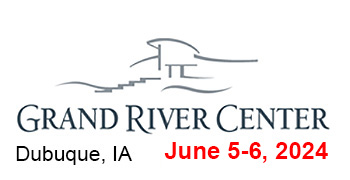

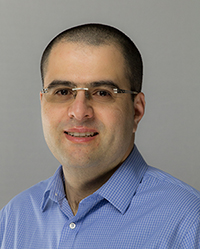 |
Arriola Apelo, PhD (Sebastian)
I have been Assistant Professor of Dairy Cattle Metabolism in the Department of Animal & Dairy Sciences (former Dairy Science) at UW-Madison since 2017. I have a bachelor's degree on animal science and agronomy from University of the Republic in Uruguay, and master and PhD degrees from Virginia Tech. Before my current position, I was an American Diabetes Association Postdoctoral fellow at UW-Madison School of Medicine and Public Health, and postdoctoral researcher on dairy cattle metabolism in Dr Mark Hanigan's group at Virginia Tech. |
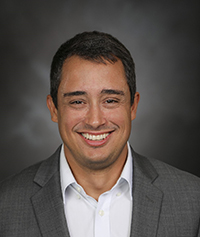 |
Luciano Caixeta, PhD
Luciano Caixeta is an Associate Professor of Dairy Production Medicine at the College of Veterinary Medicine at the University of Minnesota. Luciano was born and raised in Brazil where he was involved in beef cattle production from a young age. He obtained his DVM degree from the College of Veterinary Medicine at the Universidade Federal de Goiás in his home town of Goiânia, Brazil. Upon completing his DVM training, he moved to Cornell University where he completed a residency in production medicine and a clinical fellowship at the Cornell University Hospital for Animals. He also obtained his PhD degree in animal sciences from Cornell University. Before joining the U of M in 2017, Luciano was a clinical instructor in Dairy Population Health Management at the Colorado State University for 2 years. Dr. Caixeta's research program focuses on investigations about metabolic and infectious diseases during the transition period, the development and utilization of immunotherapeutics, and in the use of holistic approaches to understand the networks that form the complex biological systems of living animals (dairy systems biology). |
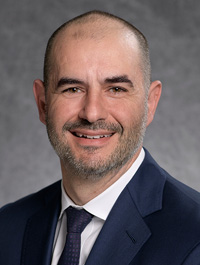 |
Phil Cardoso, PhD
Dr. Phil Cardoso is an associate professor at the University of Illinois at Urbana-Champaign. He received his D.V.M., and M.S. degrees from the Federal University of Rio Grande do Sul in Brazil and his Ph.D. from the University of Illinois. Since 2012, Phil has established a unique program and online presence that seamlessly blends his teaching, extension, and research efforts. Phil's Dairy Science program impact by placing students in applied positions and academia. Phil and his students have published over 80 peer-reviewed manuscripts (original research and invited reviews) and 3 invited book chapters to date. The program builds from questions from dairy producers and focuses on having the dairy cow's diet as a medical prescription for performance, health, and reproduction. That is achieved by understanding the impact of nutrition on metabolism, reproduction, and health in dairy cows, as well as mechanisms of metabolic adaptation to stressors and forage quality. |
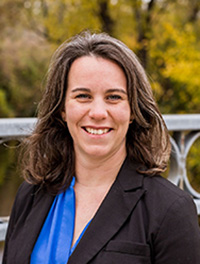 |
Gail Carpenter, PhD
Gail Carpenter is the state dairy extension specialist for Iowa State University. She holds her degrees from Michigan State University (B.S.), the University of Minnesota (M.S.), and Kansas State University (Ph.D.). Before joining the Iowa State faculty in 2021, Gail was a dairy nutritionist with CSA Animal Nutrition in Dayton, OH and an assistant professor in applied dairy nutrition and management at the University of Guelph, Ridgetown Campus. Gail reads too much and would rather be hiking than in the office, but fortunately, her extension work keeps her busy around Iowa so she is never bored |
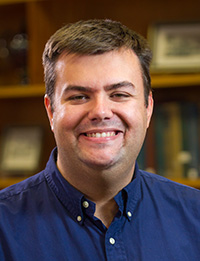 |
Luiz Ferraretto, PhD
Dr. Luiz Ferraretto is a Ruminant Nutrition Extension Specialist in the Department of Animal and Dairy Sciences at University of Wisconsin-Madison, and his research interests are applied dairy cattle nutrition and management with emphasis on starch and fiber utilization by dairy cows, forage quality and digestibility, and the development and evaluation of assays for feed and forage analysis. |
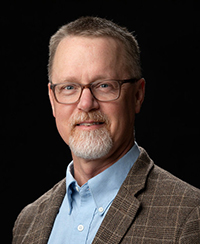 |
Paul Fricke, PhD
Dr. Paul Fricke was raised on his family's row crop and dairy farm located near Papillion, Nebraska where his father and uncle continue to farm today. After receiving a B.S. degree in Animal Science in 1988 from the University of Nebraska, Paul went on to complete a M.S. degree in 1992 and a Ph.D. degree in 1996 in Reproductive Physiology from the department of Animal Sciences at North Dakota State University. Paul worked as a Postdoctoral Research Associate in the Department of Dairy Science at the University of Wisconsin-Madison from 1995 to 1998 and then joined the faculty on July 1, 1998. Dr. Fricke was promoted to Associate Professor with tenure in 2004 and to Full Professor in 2009. His current position includes 70% Extension and 30% research appointments in dairy cattle reproduction. Dr. Fricke's research program focuses on understanding the biology underlying the many reproductive problems of dairy cattle. Dr. Fricke has authored or co-authored 103 peer-reviewed journal publications, 131 abstracts, and 6 book chapters. He has mentored 16 M.S. and 6 Ph.D. students, and his research program has attracted more than $4.2 million in extramural research grants, contracts, and gifts. In 2014, Dr. Fricke was awarded a six-month research sabbatical as a visiting scientist at the Teagasc Moorepark Animal & Grassland Research Innovation Centre in Fermoy, Co. Cork, Ireland. The goal of Dr. Fricke's extension program is to improve reproductive efficiency of dairy cattle by applying scientific research to develop practical management strategies and assess new reproductive technologies. Dr. Fricke is a sought-after speaker and has spoken to over 500 audiences in Wisconsin since 1998. In addition, Paul has presented at conferences in 35 U.S. states and 6 Canadian provinces and has been an invited speaker for international meetings in 27 countries spanning 6 continents around the world. Dr. Fricke is the recipient of several campus and national awards recognizing his innovative applied research and extension programs including the Midwest Section ADSA Outstanding Young Extension Specialist Award (2006), the University of Wisconsin-Madison College of Agricultural and Life Sciences Pound Extension Award (2006), the ADSA DeLaval Dairy Extension Award (2008), and the Wisconsin Association of County Agriculture Agents Second Mile Award (2010). |
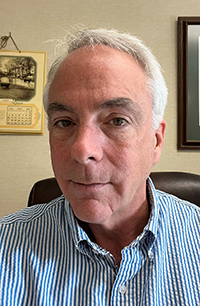 |
Rick Grant, PhD
Rick Grant was raised on a dairy farm near Potsdam, New York. He received a B.S. in Animal Science from Cornell University, a Ph.D. from Purdue University in ruminant nutrition, and completed a post-doc in forage research at the US Dairy-Forage Research Center at the University of Wisconsin-Madison. From 1990 to 2003, Rick was a professor and extension dairy specialist at the University of Nebraska in Lincoln. From 2003 to 2023, he was president of the William H. Miner Agricultural Research Institute in Chazy, NY. Rick's research interests include forages, dairy cattle nutrition, and cow behavior. He has received the Pioneer Hi-Bred Forage Research Award, the Nutrition Professionals Applied Dairy Nutrition Award, and the 2023 Distinguished Service Award from the Northeast Agribusiness and Feed Alliance. He currently authors a Feeding and Nutrition column for Hoard's Dairyman magazine and serves as a Trustee of Miner Institute and co-Trustee of the William H. Miner Foundation. |
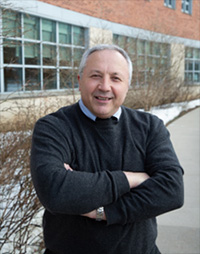 |
Alexander N. Hristov, PhD
Dr. Alexander N. Hristov is a Distinguished Professor of Dairy Nutrition in the Department of Animal Science at The Pennsylvania State University and is a member of the Feed Composition Committee of the National Animal Nutrition Program. He has a B.S. in Animal Science and a Ph.D. in Animal Nutrition from his native Bulgaria. Hristov started his career as a research scientist at the Institute of Animal Sciences, Kostinbrod, Bulgaria and has worked at the USDA-ARS Dairy Forage Research Center in Madison, WI, the Ag Canada Research Center in Lethbridge, AB, was on the faculty at the Department of Animal and Veterinary Science, University of Idaho from 1999 to 2008 and is at Penn State since 2008. Hristov's main research interests are in the areas of mitigation of nutrient losses and gaseous emissions from dairy operations and protein and amino acid nutrition of dairy cattle. As Chair (and current co-Chair) of the Network on Feed and Nutrition in Relation to Greenhouse gas Emissions (an activity of the Livestock Research Group within the Global Research Alliance on Agricultural Greenhouse Gases), Hristov led multinational projects aimed at developing region-specific databases for prediction and mitigation of enteric methane and nitrogen emissions from ruminants. He co-authored a 2018 NASEM report on anthropogenic methane emissions in the U.S., led a multi-institutional taskforce to develop a report on climate change effects on livestock in the northeast U.S., and was the lead author on the Agriculture Chapter of the 2nd State of the Carbon Cycle Report (SOCCR-2). Hristov is past division editor of the Ruminant Nutrition section, J. Anim. Sci., Associate Editor of the Can. J. Anim. Sci., and J. Dairy Sci. Editorial Board member and is current Associate Editor for the J. Agric. Sci. (Cambridge) and on the editorial board of JDS Communications. He is a member of the Scientific Advisory Board of the European Joint Programming Initiative on Agriculture, Food Security and Climate Change (FACCE-JPI). Dr. Hristov initiated and led the development of the world's first Dairy MOOC (Massive Open Online Course) with a current enrollment of over 55,000 (www.coursera.org/learn/dairy-production). He has given over 100 invited presentations and published over 220 books, book chapters, and peer-reviewed journal articles with over 18,700 citations and all-time Google Scholar H-index of 75 and i10-index of 183. |
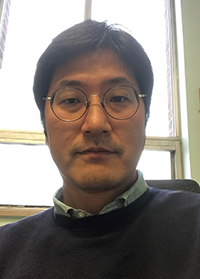 |
Chanhee Lee, PhD
Dr. Chanhee Lee is an associate professor of dairy nutrition and nutrient management at the department of Animal Sciences, The Ohio State University. Dr. Lee received a BS degree at Konkuk University, Korea, MS degree at Seoul National University, Korea, and PhD degree at Pennsylvania State University, USA. The current research interest is the development of nutritional strategies to improve nutrient use efficiency for production and decrease environmental impacts of dairy production. Especially, Dr. Lee is focused on improving N and amino acid utilization efficiency with lowering N excretion in manure. Furthermore, he is working on various byproducts as feed ingredients to reduce feed costs without negatively affecting production of cows. Another major research area is manure management. By manipulating diet ingredients or composition, he has been trying to alter manure characteristics to reduce ammonia and greenhouse gas emissions from manure and to increase the value of manure as fertilizer. |
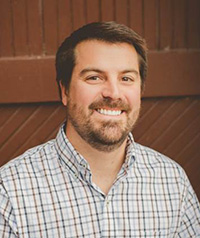 |
João Paulo Martins, PhD
Dr. João Paulo (JP) Martins was born and raised in Rio de Janeiro, Brazil. His parents owned a 20-cow dairy farm in the Brazilian dairy state of Minas Gerais. He earned his Veterinary Degree from Universidade Federal Fluminense (Brazil) in 2005 and spent almost two years as a bovine practitioner in Brazil. In 2007, he came to the US to work as a Research Assistant for Dr. Richard Pursley in the Department of Animal Science at Michigan State University (MSU). He received his M.S. and Ph.D. in Animal Science, focused on dairy cattle reproduction physiology and management under the mentorship of Dr. Pursley. After completing his doctorate, Dr. Martins worked as a Dairy Extension Advisor for two years at the University of California Cooperative Extension-Tulare, assisting dairy producers, allied industry personnel, and bovine veterinarians. In August 2018, he joined the Food Animal Production Medicine Team at the School of Veterinary Medicine, UW-Madison, serving as an Assistant Professor in Bovine Reproduction. Dr. Martins is responsible for teaching the fourth-year clinical rotation in Dairy Skills 1, 2, and 3 and bovine reproduction to third-year vet students. His outreach activities include troubleshooting poor reproductive performance of dairy herds and disseminating research-based information for dairy veterinarians and producers in Wisconsin. Dr. Martins' research interests include ovarian follicle development, luteolysis, embryonic and fetal development, pregnancy maintenance, and synchronization of ovulation strategies. His research focuses on improving reproductive and production performance of dairy cattle through the use of practical reproductive management technologies. Dr. Martins has authored or co-authored 30 peer-reviewed scientific journal publications and 40 abstracts presented at national conferences. |
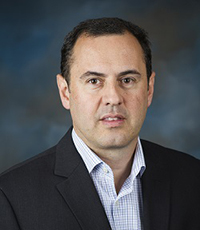 |
José Eduardo P. Santos, PhD, DVM, MSc
José E. P. Santos is a Research Foundation Professor in the Department of Animal Sciences at the University of Florida, USA. José received his DVM degree from São Paulo State University in Brazil in 1992, completed the MSc and PhD degrees in 1995 and 1997, respectively, at the University of Arizona (USA), a clinical residency in Dairy Production Medicine in 2000 in the School of Veterinary Medicine at the University of California Davis (USA), and a sabbatical in 2017 at SBScibus and the University of Sydney in Australia. He was an Assistant (2000 to 2004) and Associate Professor (2004 to 2008) in the School of Veterinary Medicine at the University of California Davis with clinical and research responsibilities before moving to the University of Florida in 2008. José has been the major professor of 41 graduate and he has hosted 12 post-doctorates and sabbatical visitors, and another 127 visiting students. He has published 284 manuscripts in the peer-reviewed scientific literature, 16 book chapters, and has given have more than 450 presentations in technical and scientific meetings, and received over $17 million in research funds as PI and Co-PI. José is a Fellow of the American Association for Advancement of Science, Fellow of the American Dairy Science Association, and he has been awarded the Young Scientist Award, the Physiology Award, the Extension Award, and the Applied Dairy Nutrition Award all from the American Dairy Science Association, among other awards from the University of California Davis and the University of Florida. José's research seeks to develop technologies that enhance efficiency of dairy production, in particular improvements in peripartum health and reproduction. The research is highly integrative, combining components of basic cellular biology, whole animal physiology, and applied interventions that are adopted by dairy producers worldwide. |
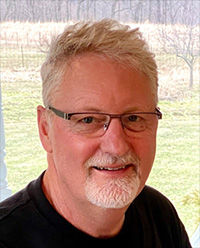 |
Mike VandeHaar, PhD
Mike VandeHaar is a professor of dairy nutrition at Michigan State University. He grew up on a dairy farm near Pella, Iowa, and completed his A.B. in biology at Dordt College in Sioux Center, IA, and his Ph.D. in nutritional physiology at Iowa State University. He just completed his 35th year as professor at Michigan State University, and he has taught nutrition or lactation to 5090 students over that time! For the past 13 years, he has been leading a group of US researchers to develop genomic tools to improve feed efficiency; this work led to the Feed Saved trait that is now part of the Net Merit Index. Other recent projects include new predictions for intake and digestion in cows and growth in heifers, studies on protein efficiency and on the value of nonforage fiber sources and other byproduct feeds in cows, and studies on the value of supplemental omega-3 fatty acids and transition milk in young calves. Mike recently served on the US National Academy committee to reevaluate Nutrient Requirements of Dairy Cattle and is the Vice President (President-elect) for the American Dairy Science Association. |
 |
Bill Weiss, PhD
Dr. Bill Weiss is a Professor emeritus of dairy cattle nutrition at The Ohio State University. During his 40 year career at Ohio State he conducted research on the effects of minerals and vitamins on cow health, feed evaluation, and methods to incorporate variability into ration formulation for dairy cattle. He has published more than 150 journal articles and hundreds of proceedings and extension articles. He has won several American Dairy Science Association awards and was named a Fellow of ADSA in 2015. He served on the 2001 Dairy NRC committee and as co-chair on the 2021 NASEM Dairy Committee. |

